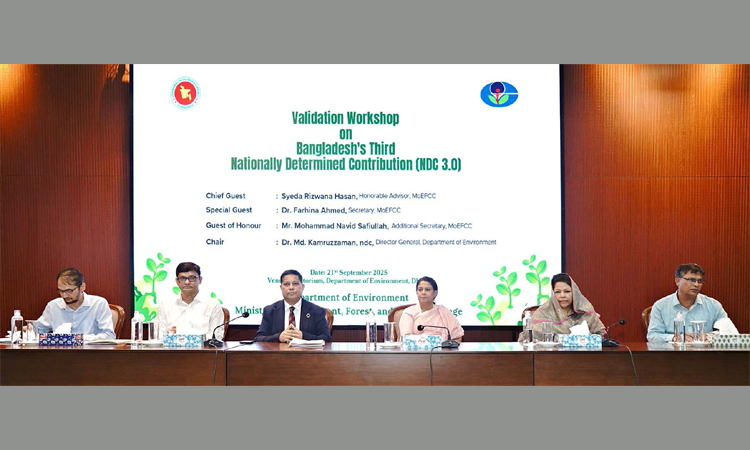News Flash
News Flash

DHAKA, Sept 21, 2025 (BSS)- Environment, Forest and Climate Change Adviser Syeda Rizwana Hasan today said that Bangladesh would require a total of USD 116.8 billion to implement its newly prepared NDC 3.0 (Third Nationally Determined Contribution) plan aimed at reducing carbon emission.
Of this, USD 25.95 billion is estimated for unconditional investment, while USD 90.23 billion will be needed under conditional investment scenarios, she said.
Rizwana, also the Adviser of the Ministry of Water Resources, revealed this while addressing as the Chief Guest at the “Validation Workshop on the Third Nationally Determined Contribution (NDC 3.0)” held at the Department of Environment (DoE) in Agargaon, said a PID release.
She informed that the plan has set a target to reduce a total of 84.92 million tonnes of CO?eq emissions by 2035. This includes 26.7 million tonnes (6.39%) unconditionally and 58.2 million tonnes (13.91%) conditionally.
The adviser said, “NDC 3.0 is not only a plan for emission reduction, but also a pledge to build an inclusive and just future.”
She stressed prioritizing the participation of women, children, elderly people, and persons with disabilities, ethnic minorities and climate migrants, while also calling for climate actions to be rights-based so that no one is left behind.
Highlighting the importance of youth engagement, she said that through renewable energy projects, green entrepreneurship, research, and awareness programs, the youth can play a transformative role in building a climate-resilient Bangladesh for future generations.
Rizwana further emphasized that the health, water and sanitation, education, food security, agriculture, and infrastructure sectors must be made climate-resilient and environment friendly.
She added that climate education and green skills should be integrated into the national curriculum to prepare the young generation for climate challenges.
On the transition to renewable energy, the Adviser underlined the importance of ensuring a “Just Transition”, which requires retraining workers, supporting small entrepreneurs, and ensuring the participation of vulnerable communities.
“Without the collective efforts of the government, development partners, private sector, researchers, and civil society, it won’t be possible to build a sustainable, inclusive, and climate resilient Bangladesh,” she added.
Dr. Farhina Ahmed, Secretary of the Ministry of Environment, Forest and Climate Change, and Mohammad Navid Shafiullah, Additional Secretary (Climate Change) also spoke on the occasion.
DoE Director General Dr. Md. Kamruzzaman was in the chair while Joint Secretary Dharitri Kumar was the moderator.
Representatives from various national and international government and non-government organizations took part in the open discussion session.